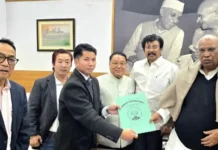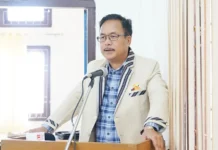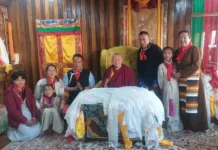ITANAGAR, Apr 18: The state level coordination committee of Landscape Initiative for Far-Eastern Himalaya (Hi-LIFE) programme held its first meeting at PCCF’s office here on Wednesday, wherein the progress and future activities of the programme were reviewed.
Chairman of the SLCC, Omkar Singh, PCCF & PS (E&F), highlighted the biodiversity significance of Hi-LIFE project area Namdapha National Park cum Tiger reserve.
He hoped the meeting will go a long way in addressing the challenges and opportunities of Hi-LIFE programme implementation in India.
Chief Policy Advisor, International Centre for Integrated Mountain Development (ICIMOD) BMS Rathore gave an overview on trans-boundary landscapes development programmes which are being implemented in different regions of the Himalayas.
He appealed to all the participants to share experiences and knowledge to take a holistic approach to biodiversity conservation and livelihood development of the local community living within the landscape.
“We need to bring together common issues of the partner countries in one platform and work together,” he said.
Nawraj Pradhan, Hi-LIFE India Coordinator from ICIMOD highlighted the proposed key Hi-LIFE 2018 activities for India, including ecotourism development, bamboo value chain and integrated orchard development as priority areas. He also shared success stories of the Kailash Landscape programmes during his deliberation.
MS Lodhi, SIC, GBPNIHESD presented the overall progress made so far and achievements under Hi-LIFE programme.
Dr R Kemp, PCCF (WL&BD) stressed the need of biodiversity conservation and sustainable livelihood development in Namdapha National Park. Dr RM Pant, Director (NIRD&PR), Guwahati emphasized the need of capacity building of local youth in ecotourism, bamboo value chain development etc.
Sangey Shring, Field Director Namdapha National Park highlighted the ground level issues and challenges of the National Park.
Issues related to state priorities and levering of funds, NMHS funding opportunities and community based activities were also discussed and participants provided valuable suggestions for HI-LIFE project implementation.
The meeting was attended by participants from diverse stakeholders, including representatives from line departments of Government of Arunachal Pradesh, subject experts from RFRI, Jorhat, ZSI, BSI, RGU, members from WWF-India, SECOW and others.
The meeting was organized by GB Pant National Institute of Himalayan Environment & Sustainable Development, North East Regional Centre, Itanagar in collaboration with the state department of Environment and Forests, and International Centre for Integrated Mountain Development, Nepal.



